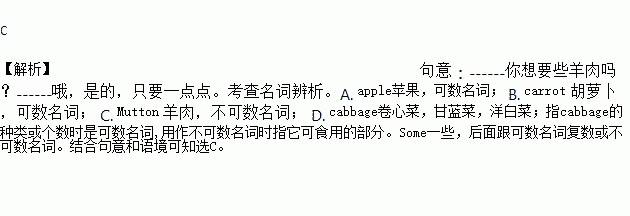题目内容
—Would you like some ________?—Oh,yes,just a little.
A. apple B. carrot C. mutton D. cabbage
(A)
A Big Sale (甩卖) for the May Day Holiday! | |||
| Lemons: ¥2 | Meat: ¥22/kg | Coke: ¥4.6/bottle |
|
|
| Biscuits: ¥15.8/box |
Time: April 28th ~May 3rd 8:30 a.m.~ 9:30 p.m. Special Offer: If a person shops over fifty yuan, he or she can get a small gift. | |||
1.This may be an advertisement (广告) of a ▲ .
A. bookshop B. cinema C. restaurant D. supermarket
2.If Mrs. Li wants to buy a bag of rice, two kilos of eggs and three cartons of milk, she should pay ▲ .
A. ¥40 B. ¥56 C. ¥76 D. ¥156
3.When can we buy these things at a low price?
A. At 7 a.m. on May 1st. B. At 9 p.m. on April 30th.
C. At 8 p.m. on May 4th. D. At 10 a.m. on April 3rd.


 Milk: ¥4/carton
Milk: ¥4/carton .2 each
.2 each

 Salt: ¥3.5/bag
Salt: ¥3.5/bag Rice: ¥40/bag
Rice: ¥40/bag Eggs: ¥12/kg
Eggs: ¥12/kg